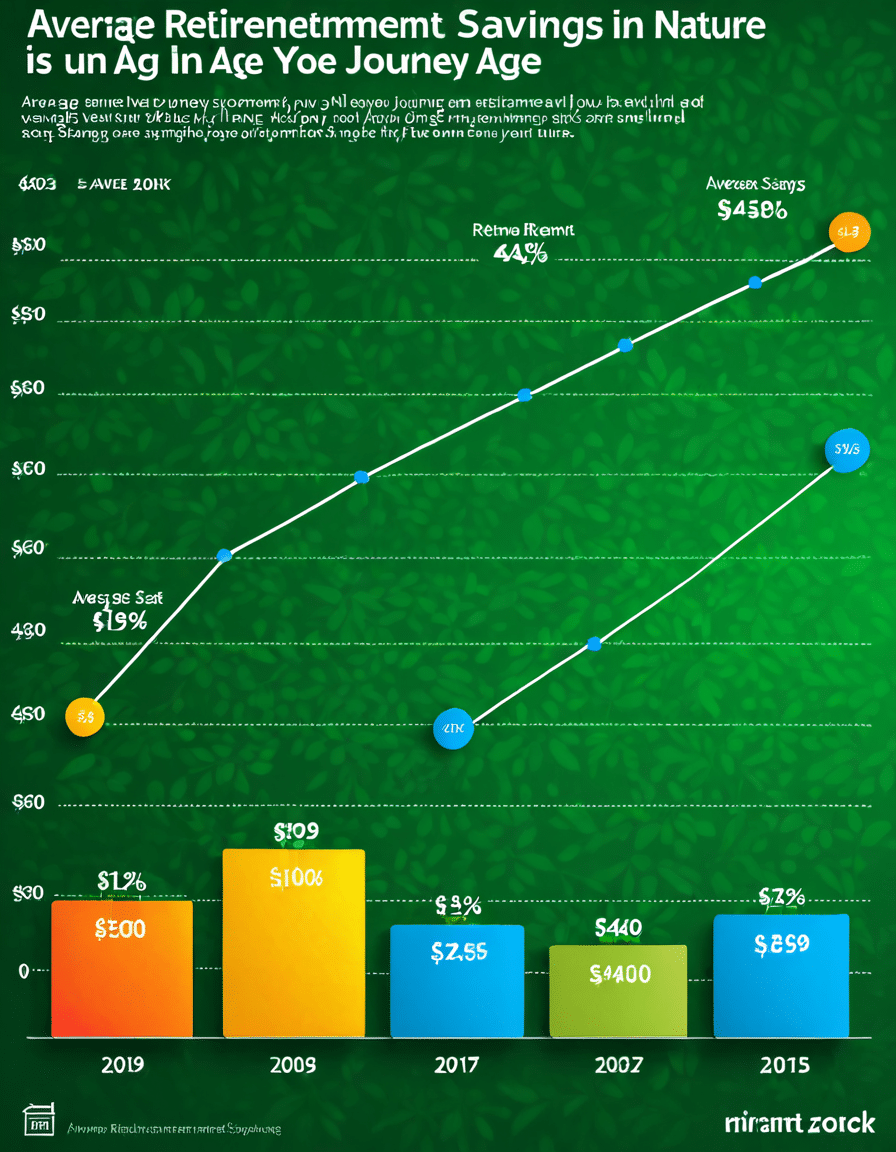Understanding the average retirement savings by age is crucial for planning a financially secure future. With people living longer and retirement costs rising, knowing where you should stand can help in strategizing your savings. This article explores average retirement savings across different life stages, coupled with insights into average net worth and 401k balances by age. Prepare yourself for some eye-opening numbers, as they can guide you toward a brighter financial future.

1. Average Retirement Savings by Age: The Key Milestones
20s: The Foundation of Savings
In your 20s, saving for retirement might not seem pressing, but this is the best time to begin paving your path. The average retirement savings for individuals in this age group hovers around $20,000. If you’re working for a company like Google, their generous matching policy can skyrocket your savings right from the get-go. So, if you’re eligible for a 401k, capitalize on that match as it’s essentially free money!
To jumpstart your savings, consider the following strategies:
– Start small: Contribute a portion of your salary. Even 5% adds up over time.
– Set clear savings goals.
– Educate yourself on investment options to maximize growth.
30s: Accelerating Contributions
As you transition into your 30s, average retirement savings rise to approximately $100,000. Most folks have secured stable careers by now and can allocate more funds toward retirement. The average 401k balance typically exceeds $50,000, reflecting increased awareness of compounding interest and diversified investments.
In this decade, aim for:
– Increasing your contributions as your salary grows.
– Diversifying investments including stocks and bonds.
– Taking advantage of healthcare and other employer benefits.
40s: Hitting Stride with Savings
By the time you hit your 40s, average retirement savings should ideally reach $250,000. This is often when many folks get serious about retirement planning. Many begin consulting experts to optimize their financial strategies. The average net worth by age 40 pushes around $300,000, emphasizing the importance of persistent savings and judicious investing.
Consider these goals in your 40s:
– Enhance your emergency fund to cover at least 6 months of expenses.
– Reassess and adjust your investment portfolio.
– Evaluate your debt, especially high-interest credit card debt.
50s: Preparing for Retirement
As retirement approaches, individuals in their 50s typically should have average retirement savings of about $500,000. This period often becomes a sprint as the focus shifts toward ensuring a comfortable lifestyle in retirement. Many see their average 401k balances reaching around $150,000. Take inspiration from financial practitioners like Warren Buffett, who emphasizes the power of consistent investment.
In your 50s, focus on:
– Catch-up contributions to 401k plans for individuals over 50.
– Financial planning for healthcare costs in retirement.
– Strategizing income streams post-retirement.
60s and Beyond: The Retirement Ready Phase
Reaching your 60s usually means you’re in solid shape financially, with average retirement savings around $800,000. The average net worth by age 60 can peak at about $700,000. Many retirees begin withdrawing from their retirement accounts, enjoying the fruits of their labor. Companies like Fidelity help retirees navigate these transitions effectively.
During your 60s, prioritize:
– Diversifying income sources, such as setting aside funds for Social Security.
– Creating a budget to manage retirement expenses.
– Engaging in routine financial check-ups.

2. Average 401k Balance and Its Impact on Retirement Planning
The average 401k balance by age plays a vital role in establishing overall retirement savings. Incorporating contributions from bonuses and employer matches can dramatically impact long-term growth. For instance, a company like Apple often has extensive employee benefits, allowing workers to maximize retirement saving opportunities compared to smaller firms with less generous packages.
The key takeaways for 401k planning are:
– Always invest up to the company match, if available.
– Regularly re-evaluate your investment allocations.
– Understand the fees associated with your 401k plan, as they can eat into your savings.
3. Evaluating Your Financial Fitness: The Net Worth Comparison
Evaluating net worth by age provides a broader perspective on financial health. So while the average 401k balance for someone in their 50s might be around $150,000, total net worth should ideally be about three to five times that amount. Integrate other assets—like homes, investments, and savings—to gauge your true financial standing.
Reflect on these strategies for evaluating financial fitness:
– Regularly update your net worth statement by listing all assets and liabilities.
– Invest in long-term assets, such as real estate, to grow your wealth.
– Consult with financial advisors to streamline your overall strategy.
Innovating Your Retirement Strategy: Actionable Steps
Knowing the average retirement savings by age is just one piece of the puzzle. Cultivating a diversified portfolio including stocks, real estate, and bonds, along with continuous education on financial strategies, can elevate your total savings beyond those averages. Reviewing your contributions and overall financial plans every few years is essential. Seek guidance from financial experts to craft plans that resonate with your aspirations.
Understanding these metrics and taking concrete actions can lead to better financial decisions, ensuring you not only hit but exceed the provided benchmarks, steering toward a rewarding retirement. With the right planning and education, you can secure a financially sound future, allowing you to enjoy the rewards of your hard work.
Start laying your groundwork today. Remember, building wealth doesn’t happen overnight, but consistent effort can yield incredible results down the line. Happy saving!
Average Retirement Savings by Age You Should Know
Fun Facts About Retirement Savings
Did you know that the average retirement savings by age can reveal a lot about financial health across different stages of life? For instance, folks in their 20s should aim to save at least a little—say, 10% of their income. You might wonder what that looks like compared to other expenses, like the fee for a spirit flight, which can have you scrambling for spare change just to satisfy your wanderlust! However, it’s essential to prioritize those savings, so your future self thanks you while sipping piña coladas on the beach.
When you’re in your 30s, the game changes a bit. The recommended average retirement savings by age bumps up significantly; hitting that 1x your annual income milestone becomes crucial. Think about it—what if you put that savings into something like an umbrella plant? Just like that plant grows and thrives, so can your retirement account! And as you transition into your 40s, it’s more vital than ever to ramp up those savings. By this time, you’ve likely got family expenses and a few kids in the mix. Just like keeping track of BWI departures, managing your budget while saving can seem tricky, but every dollar counts.
As you hit your 50s, many financial experts suggest having around six times your annual income saved. The average retirement savings by age begins to align with personal goals—such as putting the kids through college or planning that long-awaited trip to see San Diego State play in the championship. Remember, every step helps you prepare for the golden years! And don’t let economic fluctuations, akin to the moments when a Russian submarine Cuba makes front-page news, throw you off track. Stay focused, invest wisely, and keep that savings healthy!
As we venture into retirement age, the average retirement savings by age can become a source of stress or relief. By the time you near retirement, ideally, you should have about eight times your annual income saved up. So, let’s not overlook manageable trends like keeping an eye on the California tax rate, as taxes don’t stop once you’re retired. And remember to check out engaging platforms like the Google review show every now and then for motivation and tips on financial planning. Just like Spencer Macpherson from the silver screen navigates his career, you too can navigate the financial landscape with careful planning and exciting adventures ahead!



